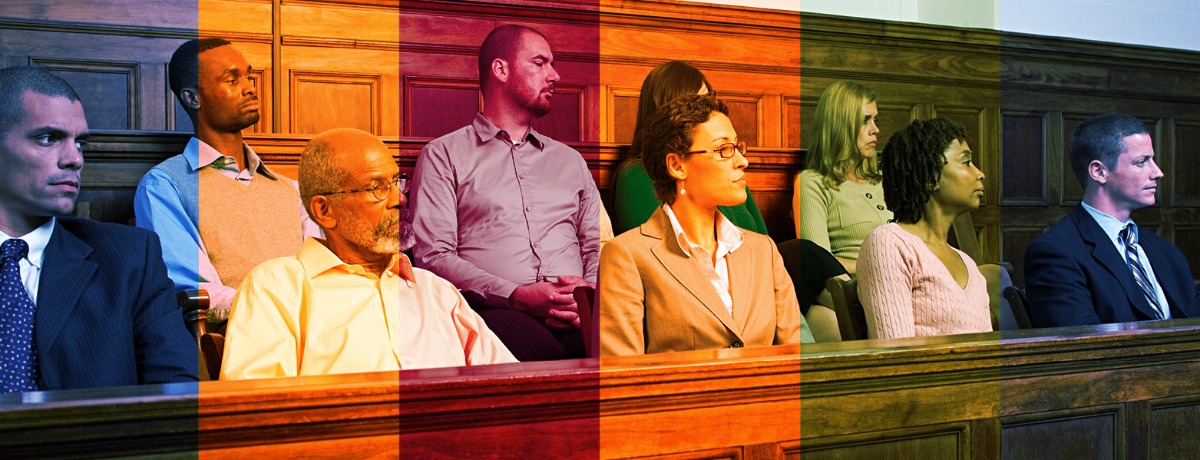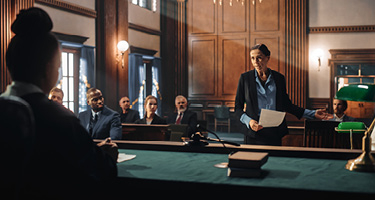Jury selection is the single most important phase of trial. Securing an open and honest jury can be challenging, but failure to do so often makes the likelihood of obtaining a favorable verdict nonexistent. It is critical to frame a case through voir dire questions, not only to help reveal favorable and unfavorable jurors, but also to set the favorable jurors on a cognitive path that most closely aligns with the values of your case and puts you in the best position to obtain a just verdict.
The term “framing” is often tossed around by law professionals but can mean different things to different people. Framing can be used interchangeably with words such as “heuristic,” “schema,” and “theme.” In his book, Case Framing, Rhode Island trial lawyer Mark Mandell describes a case frame as “the fundamental principle that gives meaning to a case.” He identifies two essential qualities of a case frame—first it must be relevant to the facts of the case, and second, it must be a principle that has near universal application to society.
How then do legal professionals frame the jury during voir dire to ensure a plaintiff has the best chance of receiving a favorable verdict?
Before addressing how to effectively frame a jury, it’s important to recognize that experienced defense counsel also attempts to frame the jury against the plaintiff. It’s common for defense counsel to ask some version of this question: How many people think that just because a plaintiff has filed a lawsuit, she is entitled to get some money? By asking this seemingly innocuous question, counsel is communicating several negative case frames—this is a frivolous lawsuit, she’s out to get money—as a counter to whatever beneficial frames were previously put in place for the plaintiff.
To frame the jury during voir dire, you must first identify emotional triggers, what Mark Mandell refers to as the “I just can’t get over issues,” in the case. For example, a case may involve an on-call doctor who did not care enough for his patient to come to their bedside in a timely manner when called. The frame is then a medical professional who puts his own interests above those of his patients. This may lead to the following voir dire questions.
- How many folks have been to see a doctor in the past year?
- How many folks think that the level of care you receive from doctors today has gotten better than the care you received from doctors 20 years ago? How many think the care has gotten worse? Stayed the same?
Ideally, the jury will then consider their own experience with a doctor and move into alignment with the plaintiff who also went to the doctor. Not only do trial attorneys learn valuable information about the juror’s personal experience by asking these questions, but they are also framing the jury in a way that causes them to focus on the defendant doctor. This while exploring feelings around medical professionals not caring as much about patients now in the age of managed care as they did in the past.
Do Your Job
One of the most powerful case frames a trial lawyer can implement is Do Your Job. It doesn’t matter what profession the defendant is in—truck driver, safety manager, or a neurosurgeon—it is a universal principle that everyone must do their job. When you have a radiologist, for example, that misreads a CT image and fails to note a blood clot in the brain, on the basest level he did not do his job. During voir dire, you’ll want to begin framing the jury by introducing the Do Your Job frame through your questions.
System Failure
Another important, perhaps most important, case frame is System Failure. It’s common for jurors to forgive simple mistakes like failing to look in the right direction at the right time, or in a medical malpractice case, nicking an organ with the scalpel or over-tightening a screw. They’ll often tend to fall back on the idea that “everyone makes mistakes.” Jurors are less forgiving, however, if they perceive there are widespread system failures that endanger not just the plaintiff, but every other patient as well. For example, a system failure might be a hospital lacking adequate policies and procedures to ensure proper hand-off communications during nursing shift changes, so that critical information is not passed along and the patient, in turn, suffers harm.
Know Your Limits
Know Your Limits is another powerful case frame that has application in all types of cases. In medical malpractice cases specifically, it is increasingly common to see family care physicians working as hospitalists, gatekeepers at hospitals who admit patients from the emergency department to the mailroom floor. In my own experience, these hospitalists often do not have the neurological training to recognize stroke signs and symptoms, which can have disastrous consequences for the patient. Know Your Limits can be an effective case frame to underscore the importance of calling for a specialist consult when a patient shows neurological signs consistent with a stroke. In a trucking case, where the defendant driver is accused of driving while fatigued, the Know Your Limits frame might revolve around knowing when to pull over and rest. Again, the Know Your Limits frame has universal application and will resonate with just about every potential juror.
In the end, success at trial is a function of the preparation that takes place long before you show up to trial. It is critical to put in the work to identify the case frames for all phases of the trial, liability, and damages. Once these case frames are identified, carefully craft questions for voir dire to introduce chosen frames and set the jury down the intended path, ultimately leading to a just verdict for your client.
-------------------
With more than 25 years of legal experience, Lloyd Bell has built a sterling courtroom record and recovered millions of dollars for medical malpractice victims. A veteran of the U.S. Army JAG Corps, Bell founded his own law firm in 1999, and he is consistently recognized as one of the top attorneys in his field. In 2018, Bell Law Firm was recognized as Personal Injury Litigation Team of the Year by The Daily Report, the leading source of legal news in Atlanta.
































